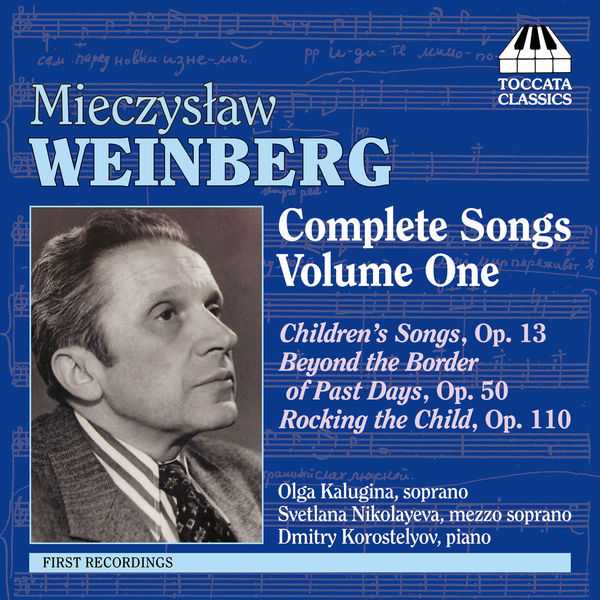
Composer: Mieczysław Weinberg
Performer: Olga Kalugina, Svetlana Nilolayeva, Dmitry Korostelyov
Format: FLAC (tracks)
Label: Toccata
Catalogue: TOCC0078
Release: 2008
Size: 227 MB
Recovery: +3%
Scan: cover
Children’s Song, Op. 13
01. I. Introduction
02. II. The Bread Roll
03. III. Cradle Song
04. IV. The Hunter
05. V. On the Green Mountainside
06. VI. Grief, “The Orphan’s Letter”
Beyond the Border of Past Days, Op. 50
07. No. 1. Dedication
08. No. 2. War burns indomitably
09. No. 3. What for?
10. No. 4. Much has fallen silent
11. No. 5. The poor ignoramuses laughed
12. No. 6. A Spring Evening
13. No. 7. In the Twilight
14. No. 8. Someone was sighing at the grave
15. No. 9. A Voice
16. No. 10. Memory
Rocking the Child, Op. 110
17. No. 1. The child was left alone
18. No. 2. And I am not alone
19. No. 3. Little feet, little hands
20. No. 4. Rocking the cradle
21. No. 5. Night
22. No. 6. A sorrowful mother
23. No. 7. The dew
24. No. 8. Meekness
25. No. 9. Fear
26. No. 10. A discovery
27. No. 11. My song
Mieczyslaw Weinberg (1919–96), the Polish-born composer who spent most of his life in the Soviet Union, was a close friend of Shostakovich, with whose musical language his own has much in common. Weinberg’s vast output includes 26 symphonies, seventeen string quartets and some 200 songs. The three song-cycles recorded here date from across Weinberg’s career. They demonstrate his extraordinary ability to create atmosphere, often from just a handful of notes, and encompass a wide range of emotion, from wartime suffering, through playfulness and protest, to maternal love.
Weinberg was born in Warsaw on 8 December 1919; his early musical experiences were as pianist and ensemble leader at a Jewish theatre where his father was composer and violinist.
From the age of twelve he took piano lessons with Jozef Turczinski at the Warsaw Conservatory; the outbreak of war thwarted his plans to study in the USA.
In 1939 Weinberg fled the Nazi occupation (in which his parents and sister Ester were murdered), in the first instance to Belorussia, then Minsk, where he attended the composition classes of Vasily Zolotaryov, a former student of Rimsky-Korsakov; with the Nazi invasion of the USSR in June 1941, he moved on to Tashkent in Uzbekistan.
At the invitation of Shostakovich, who had been impressed with the score of Weinberg’s First Symphony, he moved to Moscow, where he lived from 1943 until his death on 26 February 1996.
Like Shostakovich’s, Weinberg’s literary interests were wide-ranging, and he set poetry not only of Russian/Soviet and Polish but also of Hungarian, Spanish and Japanese origin, as well as by Schiller and Shakespeare. His favourite topics of childlike innocence and its violation, of night, nature and consolation, are well represented on this disc.
This first CD in the complete of Weinberg’s songs includes a booklet containing comprehensive notes and translations of all of the songs included.
It forms part of a widespread examination of Weinberg’s music on CD, with orchestral music appearing from Chandos and the string quartets from CPO.
The music of Soviet-era Polish composer Mieczyslaw Weinberg is undergoing a renaissance, not only owing to interest in his close connection to Dmitry Shostakovich, but in the remarkably high quality of the work itself. Three of Weinberg’s song cycles are surveyed in Toccata Classics’ Mieczyslaw Weinberg: Complete Songs, Vol. 1, featuring soprano Olga Kalugina and mezzo-soprano Svetlana Nikolayeva, singers who have already distinguished themselves through their contributions to Toccata’s Grammy-nominated Balakirev and Russian Folksong. The cycles heard here represent a wide span within Weinberg’s output: Children’s Songs, Op. 13 (1943); Beyond the Border of Past Days, Op. 50 (1951); and Rocking the Child, Op. 110 (1973). Although Weinberg explores the theme of children in the outer cycles, these are not “children’s songs,” but serious and deeply felt works for adults; “Grief (The Orphan’s Letter)” recounts the searing tale of a homeless child whose mother has died, “No roof above me…give me shelter, for God’s sake….” This music is suitably grave and heart-wrenching, though that is but one aspect of Weinberg’s text setting; a sort of joyful ambivalence pervades “In the Twilight” in the Op. 50 set, whereas simple, lyric melancholy typifies “And I am not alone” from the Op. 110. Weinberg knew to pick his texts well — Beyond the Border of Past Days is drawn from the work of Aleksandr Blok, a key Russian symbolist whose work transits from romantic to the modern; Gabriela Mistral’s poetry is pressed into service, in Russian translation, in Rocking the Child.
Apart from a tough period in the early ’50s when he was under the scrutiny of the NKVD, Weinberg was a celebrated figure in Soviet music, but his work seldom exceeded the borders of the Soviet world. Nevertheless, he was doing much the same thing as Barber, Britten, and Rorem within the realm of art song, concentrating on the voice, maintaining a coherent melody, and using a relatively uncomplicated accompaniment. Geared toward communication and built to last, these song cycles are not intellectual but visceral, similar in tone to Mussorgsky’s cycles but with a more advanced sense of harmony and far more stylistically polished. A slight Hebraic accent surfaces in a couple of points among these three cycles, even as the poets of the first two cycles were Jewish and the original source of the first cycle written in Yiddish; Weinberg knew his limits, and one wonders to what extent such restrictions played a role in the finished product. Nevertheless, “finished” they are, the resultant cycles delivering in terms of control, mastery and drama.
The singing of Kalugina and Nikolayeva is consistently lovely and never forced; accompanist Dmitry Korostelyov keeps things tasteful and restrained, which matters, particularly in the Beyond the Border of Past Days cycle, as Weinberg’s accompaniment for this cycle is unusually skeletal and understated.